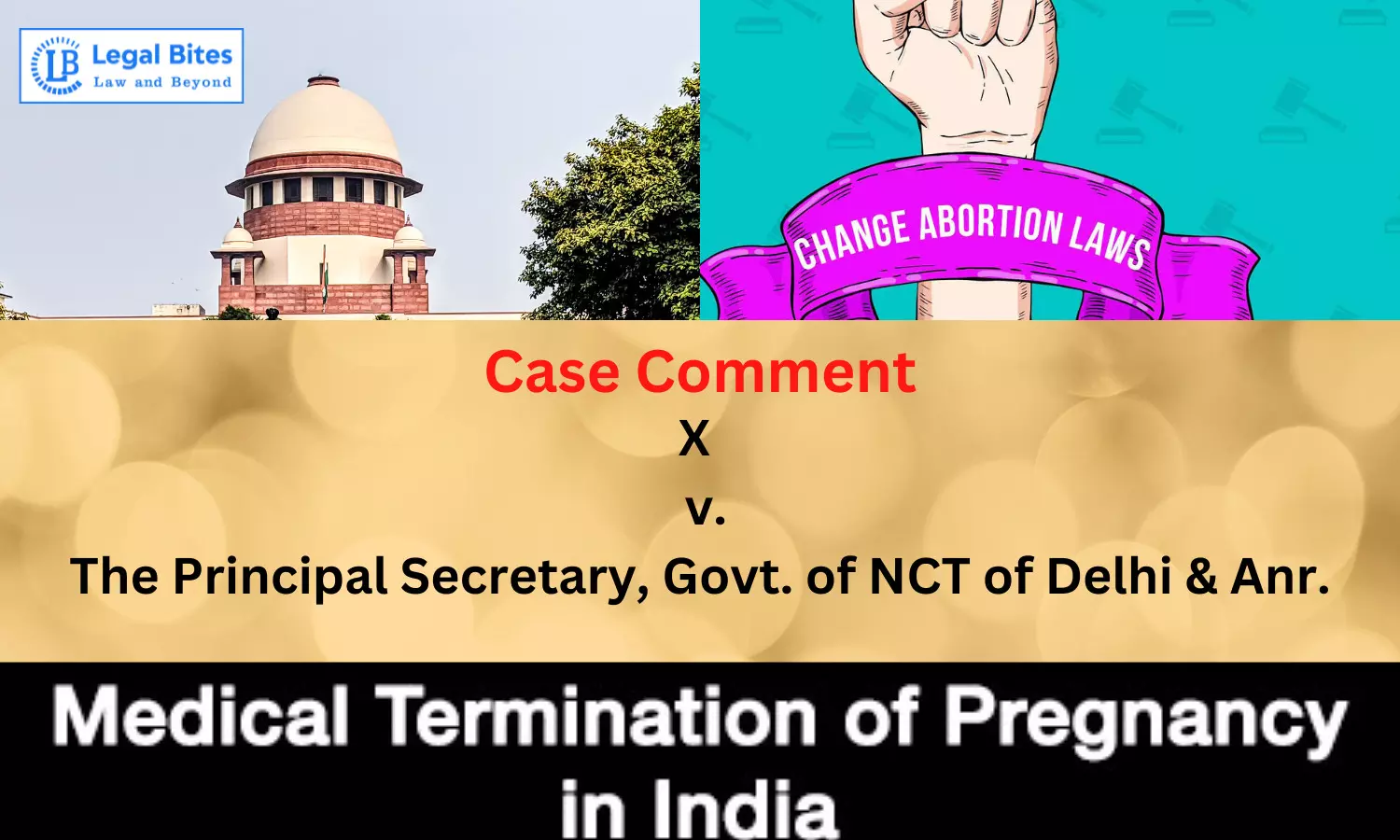Case Comment: X v. The Principal Secretary, Govt. of NCT of Delhi & Anr., (2022) Medical Termination of Pregnancy Case
This Case Comment 'X v. The Principal Secretary, Govt. of NCT of Delhi & Anr.' by Ayushi Mittal revolves around the interpretation of Rule 3B of the Medical Termination of Pregnancy Rules (hereinafter referred to as MTP Rules)

This Case Comment 'X v. The Principal Secretary, Govt. of NCT of Delhi & Anr.' by Ayushi Mittal revolves around the interpretation of Rule 3B of the Medical Termination of Pregnancy Rules (hereinafter referred to as MTP Rules).Court: The Supreme Court of IndiaBench: Justice Dr. D.Y. Chandrachud, Surya Kant & A.S. BopannaCitation: Special Leave Petition (Civil) No 12612 of 2022Appellant: XRespondent(s): The Principal Secretary, Health and Family Welfare Department, Govt. of NCT of...
This Case Comment 'X v. The Principal Secretary, Govt. of NCT of Delhi & Anr.' by Ayushi Mittal revolves around the interpretation of Rule 3B of the Medical Termination of Pregnancy Rules (hereinafter referred to as MTP Rules).
Court: The Supreme Court of India
Bench: Justice Dr. D.Y. Chandrachud, Surya Kant & A.S. Bopanna
Citation: Special Leave Petition (Civil) No 12612 of 2022
Appellant: X
Respondent(s): The Principal Secretary, Health and Family Welfare Department, Govt. of NCT of Delhi & Anr.
Facts in brief
The appellant here was an unmarried woman aged 25 years who became pregnant out of a consensual relationship. The appellant here decided to terminate her pregnancy fearful of 'raising and nurturing the child as an unmarried mother' when her partner refused to marry her at the last stage. The appellant sought permission for the same under Section 3(2)(b) and Rule 3B(c) of the MTP Rules 2003.
The Decision of both the High Court and Supreme Court
The High Court rejected the same justified that 'unmarried women' are not covered under any clauses of the said Act, therefore, Section 3(2)(b) would not be applicable to the facts of this case. The order of the High Court gave rise to the present appeal in the Supreme Court of India.
The Apex Court passed an interim order permitting the appellant to terminate her pregnancy. The Petitioners, in this case contended on various grounds such as inability to maintain and nurture the child, social stigmas, Section 3(2)(b) being violative of Article 14 of the Constitution of India. The apex court, in this case, once again analyzed the sector of abortion despite the enactment of MTP Rules. It examined the barriers such as access to safe and legal abortions, registered medical practitioners' fear of prosecution despite being permitted by the Act, given he does it in good faith, and social stigmas surrounding unmarried women.
The main focus was then put on the 'Purposive Interpretation of the statute and understanding of the legislative intent through the words used by the legislature itself. Over the years, Parliament framed legislation that didn't differentiate between women on the basis of their marital status. Legislations such as Maternity Benefit Act 1961, Hindu Succession Act 1956, Hindu Adoptions and Maintenance Act 1956, and Guardians and Wards Act 1890, the law emphasized that unmarried women have the same rights as married women in terms of adoption, succession, and maternity benefits. The Parliament enacted the MTP Act as a 'health' measure, 'humanitarian' measure, and 'eugenic' measure to provide women access to safe and legal abortions.
Amendment of MTP provisions
In light of the same, MTP Rules were amended in 2021 to extend the benefits of the statute to all women, including single and unmarried women by broadening and clarifying the scope of Section 3 of the Act. The reason why the judgment was widely applauded was because of the acknowledgement of the need for an abortion resulting from non-consensual intercourse in marriage. Secondly, Apex Court clarified that the definition of rape under the MTP Act does not strike down Exception 2 to Section 375 of IPC, which itself is pending consideration before a different bench of the same court.
Therefore, the meaning of rape must therefore be understood to include marital rape as well, solely for the purpose of the MTP Act and any rules and regulations framed thereunder. Also, this judgment doesn't dilute any provisions of Pre- Conception and Pre-Natal Diagnostic Techniques Act 1994. Constitutional values such as the right to reproductive autonomy, the right to live a dignified life, the right to equality, and the right to privacy largely animated the interpretation of the MTP Act and MTP Rules. Therefore the Supreme Court disposed off, the present appeal.
References
1. The Constitution of India, Available Here
2. Medical Termination of Pregnancy Act, Available Here
Important Links
Law Library: Notes and Study material for LLB, LL, Judiciary, and Entrance Exams

Ayushi Mittal
Christ (Deemed to be University), Bengaluru
